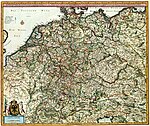 Global Information
Global InformationHistory of Germany information
This article may be too long to read and navigate comfortably. When this tag was added, its readable prose size was 26,000 words. (May 2023) |
This article contains too many pictures for its overall length. |
| History of Germany |
|---|
 |
|
The concept of Germany as a distinct region in Central Europe can be traced to Julius Caesar, who referred to the unconquered area east of the Rhine as Germania, thus distinguishing it from Gaul. The victory of the Germanic tribes in the Battle of the Teutoburg Forest (AD 9) prevented annexation by the Roman Empire, although the Roman provinces of Germania Superior and Germania Inferior were established along the Rhine. Following the Fall of the Western Roman Empire, the Franks conquered the other West Germanic tribes. When the Frankish Empire was divided among Charles the Great's heirs in 843, the eastern part became East Francia. In 962, Otto I became the first Holy Roman Emperor of the Holy Roman Empire, the medieval German state.
During the High Middle Ages, the Hanseatic League, dominated by German port cities, established itself along the Baltic and North Seas. The growth of a crusading element within German Christendom led to the State of the Teutonic Order along the Baltic coast in what would later become Prussia. In the Investiture Controversy, the German Emperors resisted Catholic Church authority. In the Late Middle Ages, the regional dukes, princes, and bishops gained power at the expense of the emperors. Martin Luther led the Protestant Reformation within the Catholic Church after 1517, as the northern and eastern states became Protestant, while most of the southern and western states remained Catholic. The Thirty Years' War, a civil war from 1618 to 1648 brought tremendous destruction to the Holy Roman Empire. The estates of the empire attained great autonomy in the Peace of Westphalia, the most important being Austria, Prussia, Bavaria and Saxony. With the Napoleonic Wars, feudalism fell away and the Holy Roman Empire was dissolved in 1806. Napoleon established the Confederation of the Rhine as a German puppet state, but after the French defeat, the German Confederation was established under Austrian presidency. The German revolutions of 1848–1849 failed but the Industrial Revolution modernized the German economy, leading to rapid urban growth and the emergence of the socialist movement. Prussia, with its capital Berlin, grew in power. German universities became world-class centers for science and humanities, while music and art flourished. The unification of Germany was achieved under the leadership of the Chancellor Otto von Bismarck with the formation of the German Empire in 1871. The new Reichstag, an elected parliament, had only a limited role in the imperial government. Germany joined the other powers in colonial expansion in Africa and the Pacific.
By 1900, Germany was the dominant power on the European continent and its rapidly expanding industry had surpassed Britain's while provoking it in a naval arms race. Germany led the Central Powers in World War I, but was defeated, partly occupied, forced to pay war reparations, and stripped of its colonies and significant territory along its borders. The German Revolution of 1918–1919 ended the German Empire with the abdication of Wilhelm II in 1918 and established the Weimar Republic, an ultimately unstable parliamentary democracy. In January 1933, Adolf Hitler, leader of the Nazi Party, used the economic hardships of the Great Depression along with popular resentment over the terms imposed on Germany at the end of World War I to establish a totalitarian regime. This Nazi Germany made racism, especially antisemitism, a central tenet of its policies, and became increasingly aggressive with its territorial demands, threatening war if they were not met. Germany quickly remilitarized, annexed its German-speaking neighbors and invaded Poland, triggering World War II. During the war, the Nazis established a systematic genocide program known as the Holocaust which killed 17 million people, including 6 million Jews (representing 2/3rds of the European Jewish population). By 1944, the German Army was pushed back on all fronts until finally collapsing in May 1945. Under occupation by the Allies, denazification efforts took place, large populations under former German-occupied territories were displaced, German territories were split up by the victorious powers and in the east annexed by Poland and the Soviet Union. Germany spent the entirety of the Cold War era divided into the NATO-aligned West Germany and Warsaw Pact-aligned East Germany. Germans also fled from Communist areas into West Germany, which experienced rapid economic expansion, and became the dominant economy in Western Europe.
In 1989, the Berlin Wall was opened, the Eastern Bloc collapsed, and East and West Germany were reunited in 1990. The Franco-German friendship became the basis for the political integration of Western Europe in the European Union. In 1998–1999, Germany was one of the founding countries of the eurozone. Germany remains one of the economic powerhouses of Europe, contributing about 1/4 of the eurozone's annual gross domestic product. In the early 2010s, Germany played a critical role in trying to resolve the escalating euro crisis, especially concerning Greece and other Southern European nations. In 2015, Germany faced the European migrant crisis as the main receiver of asylum seekers from Syria and other troubled regions. Germany opposed Russia's 2022 invasion of Ukraine and decided to strengthen its armed forces.